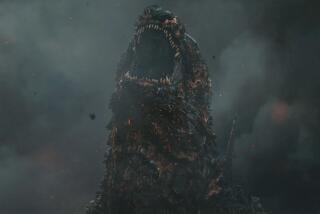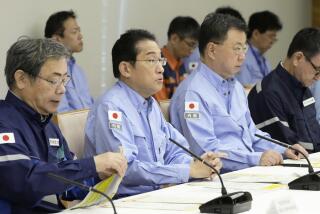Second Opinion : RAFU SHIMPO : Before Hiroshima, the Firebombs Were Worse
- Share via
I was talking to one of my former Sunday school class students following her extended stay in Japan when she remarked something to the effect of, “I don’t understand why we focus so much on the atomic bombings of Hiroshima and Nagasaki; the firebombings of Japanese cities were much worse.”
Though I’ve never forgotten that remark, I only recently found its confirmation in an article, “The General and World War III,” by Richard Rhodes (The New Yorker, June 19, 1995).
The general of the title is Curtis LeMay. “I’ll tell you what war is about,” LeMay once said, “You’ve got to kill people and when you’ve killed enough they stop fighting.”
In 1945, LeMay was sent to Japan to solve the problem caused by the jet stream to our high-altitude precision bombing. On March 10 he sent his solution over Tokyo: 325 bombers flying at low altitude and dropping jellied-gasoline firebomb clusters in the early hours. As Rhodes writes, imprecision was solved by indiscrimination:
“The mission succeeded: the United States Strategic Bombing Survey estimated that ‘probably more persons lost their lives by fire at Tokyo in a 6-hour period than at any time in the history of man.’ LeMay’s subsequent mission report emphasized that the object of the attack ‘was not to bomb indiscriminately civilian populations.’ But the destruction that first windy night was in fact indiscriminate to the point of atrocity, as LeMay himself understood: Nearly 17 square miles of the Japanese capital burned to the ground, with at least a hundred thousand people killed and hundreds of thousands injured.”
This record still holds. The area incinerated corresponds roughly to Torrance. These fire-bombings continued regularly until the end of hostilities. Sixty-three cities were hit, some destroyed completely. Though none was so deadly as the first, more than 1 million civilians were slaughtered. Neither Hiroshima nor Nagasaki broke the record, despite the greater power of the nuclear bombs.
What I found arresting is this from Rhodes:
“Years later, [LeMay] told a cadet who asked how much ‘moral considerations’ had affected his decisions, ‘I suppose if I had lost the war, I would have been tried as a war criminal. Fortunately, we were on the winning side.’ ”
While I continue to believe we are right to remember the unjustifiable obliteration of the citizens of Hiroshima and Nagasaki into nuclear oblivion, we must not forget the holocaust--the whole burnt offering--of the 1 million.
From a column by William Hohri in Rafu Shimpo, a Japanese daily published in English and Japanese in Los Angeles.
More to Read
Sign up for Essential California
The most important California stories and recommendations in your inbox every morning.
You may occasionally receive promotional content from the Los Angeles Times.













